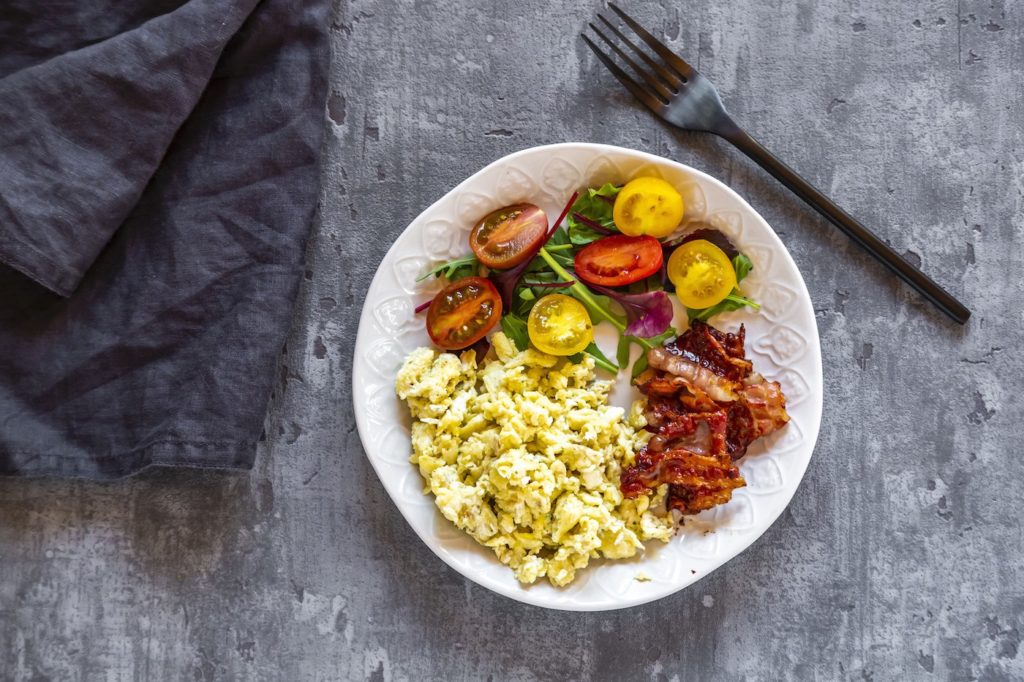You’ve decided the keto diet is the plan for you, and you’re eager to get started. But it can be tough to jump straight into a low-carb, high-fat way of eating. There’s no doubt about it—this is a restrictive meal plan. Plus, of course, there’s the fact that the diet of most Americans is high in carbs and processed foods, which are definitely on the keto naughty list. (As well as nixing all refined carbs and junk, you have to have to avoid starchy veggies, grains, sauces and juice, and limit fruits.)
So, take time to get prepared before you go full-on keto. “Go through your kitchen and pantry and get rid of foods that you don’t need for keto, or consolidate them if other people in your house will be eating them,” Naomi Whittel, Gainesville, Florida-based author of High Fiber Keto, tells Health.
Next, choose several keto recipes for the week and think about what you can grab quickly if you get hungry between meals. Make a list and go shopping. The more keto foods you have in the house, the easier it will be to stick to the plan. Whittel’s staples include avocados; olives; nuts and seeds (she recommends almonds, macadamia nuts, and pumpkin seeds); coconut and olive oils; eggs; canned salmon; and collagen protein (which you can buy in powdered form and easily mix into a hot or cold drink).
Whittel also advises stocking up on pre-washed, pre-cut veggies like mixed greens, broccoli, and zucchini, all of which are good low-carb, high-fiber options. And if you’re really short on time, you can buy these prepared from the store. Having coconut milk, frozen berries, and spinach on hand means you have everything to make a tasty keto smoothie.
Keto isn’t a quick fix
While you’re preparing your food, prepare your mindset. “It’s hard to make a big change, so really think about what’s going to keep you on track,” Whittel says. “For me, it is really helpful to connect my daily food choices to the bigger ‘why.’ Everyone has their own personal reasons behind their health choices and other individual goals that drive their interest in keto. Get clear about your ‘why’ and then remind yourself of it often.” It might help to think of keto as a lifestyle choice instead of a quick-fix diet, she adds.
Initially, Whittel recommends sticking to keto as close to 100% as possible. “This will support the body’s metabolic transition into ketosis,” she says. (Ketosis is a metabolic state where the body burns stored fat for energy instead of blood sugar.) “Keep in mind that down the road, there will likely be room to enjoy a glass of wine, a keto version of your favorite dessert, or even a higher level of carbohydrates more regularly.” So, by accommodating these “treats,” you can avoid the trap of all-or-nothing thinking, which Whittel says make it easier to get back into keto if you do stray.
Dealing with friends and family when you go keto
Sometimes the toughest part of making a big change to the way you eat is dealing with other people’s reactions. At best, they might question your choice; at worst, they might turn up at your door with a basket laden with refined carbohydrates.
“If someone is trying to ‘sabotage’ your best efforts, practice politely declining with a phrase of your choice,” Whittel says. She suggests saying something like, “I’m satisfied with what I’m eating,” or “I’m figuring out what works best for my body right now,” or “Thanks for your concern, but I’ve got this.”
Another challenge can be if you’re eating keto but the rest of your family isn’t. In this situation, Whittel suggests cooking keto as the main component of a meal, then offering carbohydrate sides for the non-keto eaters. For instance, cook steak and roasted asparagus with butter for everyone, then have some sweet potatoes or rice as a side option.
Keto has certain benefits, but it isn’t for everyone
Burning stored body fat for fuel has its benefits. The keto diet been shown to reduce seizures in people with epilepsy, and animal studies suggest that it may also have anti-aging, anti-inflammatory, and cancer-fighting benefits. But if you’re planning to go keto to lose weight, you need to know that it poses certain side effects and complications. For one thing, you could regain the weight you lost when you go back on carbohydrates. And if not done right, the diet can boost your risk of heart disease and diabetes. In fact, if you have type 1 or type 2 diabetes, experts say you shouldn’t go on a keto diet without your doctor’s advice and supervision.
Finally, be aware that keto can make you feel a little worse before you feel better. So-called “keto flu” can include both physical and emotional symptoms, including cramps, constipation, nausea, low energy, fatigue, and mood swings.
“Your body is adjusting to new foods, and your metabolism is adjusting to using fat as its primary fuel,” Whittel explains. During this time, it’s really important to stay hydrated, eat enough salt to keep your electrolytes balanced, because your body releases less insulin on keto, causing the kidneys to excrete more sodium, and rest when needed. Whittel also suggests supplements like MCT oil, digestive enzymes, and electrolytes to help your body adjust.
